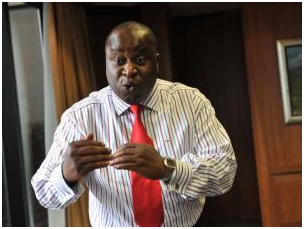
Mboweni: No will to implement labour laws
August 19 2011 at 02:26pm
Comment on this story
11/5/2009.Outgoing Reserve Bank Governer Tito Mboweni in his office,talks about his future plans. Picture : Masi Losi
South Africa’s labour legislation is correct, but the political leadership to implement it is lacking, says Anglo Gold Ashanti chairman Tito Mboweni.
Mboweni: No will to implement labour laws
August 19 2011 at 02:26pm
Comment on this story
11/5/2009.Outgoing Reserve Bank Governer Tito Mboweni in his office,talks about his future plans. Picture : Masi Losi
South Africa’s labour legislation is correct, but the political leadership to implement it is lacking, says Anglo Gold Ashanti chairman Tito Mboweni.
Mboweni, the former governor of the SA Reserve Bank and one time labour minister, said this on Friday when addressing the Black Management Forum’s 2nd Annual Young Professional’s Summit.
Acknowledging that he would probably be attacked for his comments, Mboweni said he would probably publish some kind of article detailing his thinking in the near future.
His comment on labour legislation was in answer to a question from the floor that it was those laws dealing with employment that many companies found the greatest obstacles to increasing employment.
“The architecture of the labour legislation brought a balance in power relations (between labour and employers),” he said.
Mboweni suggested that the lack of political leadership now meant that that balance was out of kilter.
He used the example of the health workers strike of 2010.
“When those workers went on strike, they knew there are laws governing the ability of essential services to go on strike. They left ICU (intensive care units) and new-born babies. Those people should have been fired, but the authorities were too scared to take action.”
Mboweni went on to say that there was nothing in labour legislation that allowed municipal workers to turn over rubbish bins while they had embarked on strike action and that local authorities should enforce their bylaws to ensure that action is taken against these workers.
“The NUM (National Union of Mineworkers), one of the most mature unions, knows that maintenance workers are not allowed to strike. They have to maintain the machinery of a mine so that when the strike is over there is still a business to return to. Their issues (of maintenance staff) must be settled at the CCMA (Commission for Conciliation, Mediation and Arbitration),” he said.
Mboweni went on to say that the CCMA had become the last port of call to settle labour disputes.
“The labour legislation was designed so that you first went to the CCMA and then, if it could not be settled, went on strike,” he said, adding that the fact the CCMA had become the last of port of call, should itself say something about leadership.
Mboweni also said that those criticising the labour legislation should become more specific about what they want changed. - I-Net Bridge
